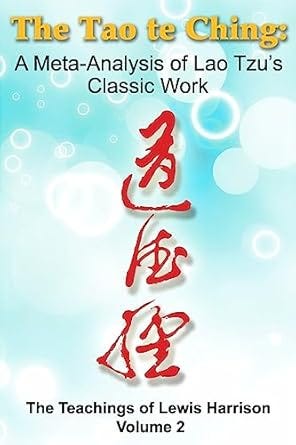A Study In Mystic Taoism And The Tao Te Ching
Preface To This Series
My journey into Taoist thought and the creation of this book began in 1972. At that time, I was studying with an Indian Guru, Maharaj Charan Singh, who told some of his students that if they really wanted to understand his teachings, a good place to start might be the Tao te Ching.
That same year, I began my undergraduate university studies in philosophy. My professor, a well-know Confucian scholar, Robert Neville, directed me to explore the Tao te Ching as part of my studies in Asian thought.
https://asklewis.substack.com/p/an-introduction-to-my-series-on-mystic
Soon after I began to explore the Tao te Ching, I fell into the throes of Western mystic fantasies, what the Buddhist teacher Chogyam Trungpa Rinpoche called “Spiritual Materialism.” This is a pseudo-state of spiritual awareness. I told one of my mentors at the time about unusual mystical experiences I had encountered, certain dreams, intuitions, déjà vu, internal visions, and such. He soon snapped me out of this “spiritual materialism” as I described these things to him.
He listened as I went on to describe these incredible experiences I had had. Then he laughed and simply said”Tao?” I had, of course already heard of Tao from my guru and my professor and so I replied, “Yes, the Tao.” To which my mentor responded, “No… Tao.”
This went on and I thought it was some kind of joke. “Yes… the Tao,” I said. “No, Tao,” he said again.
Finally, he poked his finger gently against my forehead at the ”third eye” spot and said, “Tao is not a ‘the.’ It is not a thing. It is nothing and everything and the very source of nothing and everything. Stop looking inside for a spiritual Disneyland and surrender to Tao!”
I had gotten the point.
Thus, in this version of the Tao te Ching, the term “The Tao” is avoided. Instead, the word “Tao” without “the” is used, as my mentor pointed out. This is specifically meant to be a reminder of what the nature of Tao is — something that is indescribable.
I hope you both enjoy and gain great benefit from this meta-analysis. In the end, this book is meant to be a spiritually-driven process akin to peeling an onion. With each layer removed, one gets deeper and closer to the core until there is nothing left. In the case of the Tao te Ching what remains is love, compassion, wisdom, emotional balance, clarity of thought, generosity of spirit, abundance, contentment, and happiness.
The Tao te Ching
The Tao te Ching (Dao De Jing), a collection of “paragraphs,” often referred to as the Laozi (Chinese: 老子; pinyin: Lǎozǐ), is one of the oldest Chinese classic texts. According to tradition, the text (generally pronounced “dow duh jing”), was written around the 6th century BC by the sage Lao Tzu (Chinese: pinyin 老子; Lǎozǐ, literally meaning “Old Master”). Lao, a record-keeper at the Zhou dynasty court, decided to retire and live as a monastic but wrote 81 paragraphs of great wisdom before he did so. Of course, the text’s true authorship and the date of the composition or compilation are still debated, although the oldest excavated text dates back to the late 4th century BC.
The Tao te Ching is a book of both practical and mystic wisdom which, based on the estimated time of its origins, was originally written on one-line bamboo strips linked with silk threads. It is a great jigsaw puzzle of 5,350 words, organized into 81 entries, which traditionally have been organized into two sections. Every few sentences the reader is presented with a paradox of intense and profound beauty. As one reads and explores each paragraph, one immediately gets the sense that, though on the surface all of the pieces may not easily fit together, on a deeper level each seems to form a pattern with the others on some deeper intuitive level.
The Tao te Ching, along with another book, the Chuang Tzu (Zhuangzi), is a fundamental text for any spiritual seeker and for the student of mysticism and philosophical and religious Taoism. Over the centuries these texts have strongly influenced Western metaphysics as well as many other Asian philosophical and religious traditions, including Legalism, Confucianism, and Buddhism.
When Buddhism was first introduced into China from India, it was largely interpreted through the use of Taoist words and concepts. Many Chinese and other Asian artists, including poets, painters, calligraphers, and even gardeners, have used the Tao te Ching as a source of inspiration — and still do so to this day. Its influence has also spread widely outside Asia and many clichés such as “still waters run deep” and pop culture sayings, including most of the ideas presented in the old classic American television show, “Kung Fu” — about a Taoist monk wondering through the American West of the nineteenth century — were drawn from the Tao te Ching. Today the work is among the most translated works in world literature.
,,,
You will be receiving two more of these newsletters about Taoism at no charge. After that, in order to continue receiving them you will need to upgrade to a paid subscription
please support my writing and research
…
About the creator of this series: Lewis Harrison, is a public intellectual and has been mentoring and coaching visionaries, spiritual seekers, world-class athletes, thought leaders, billionaires, and individuals seeking to become more effective, efficient, productive, and self-aware for over half a century. He has been diagnosed with Stage 4 Metastatic cancer. He is healing and presently intends to survive and prosper.
Testimonials
Here is what Jack Canfield, who wrote the introduction to Lewis’ book “Healing Depression Naturally” and who is the co-author of the Chicken Soup for the Soul Series, has to say about Lewis and his work.
“Lewis is amazing…. I recommend him to anyone who wants less stress and more energy.”
Jack Canfield, Co-author of the “Chicken Soup for the Soul “ books and star of the movie “The Secret”
“Lewis, your program was one of the first steps I took in the process of defining my interest in alternative medicine and for that I thank you. It has been over 45 years and I am continually amazed when I look back upon how easily and quickly one step has led to the next. Thank you for being there to assist in laying the foundations for all my future studies.”
Robee Fian L.Ac Former President American Association of Oriental Medicine (AAOM)
A friend started a fundraiser on GoFundMe and it would mean so much if you could take a look at it.
She wrote “Any help, like donating or sharing, gets Lewis closer to his goal. Thank you in advance for your kindness and support.”
Donate to Support Lewis Harrison’s Cancer Battle, organized by Phyllis Haynes
Donate to Support Lewis Harrison's Cancer Battle, organized by Phyllis Haynes
https://gofund.me/130a166f
The Life Strategies Playbook & Mentoring Program is a reader-supported publication. To receive new posts and support my work, consider becoming a free or paid subscriber.





